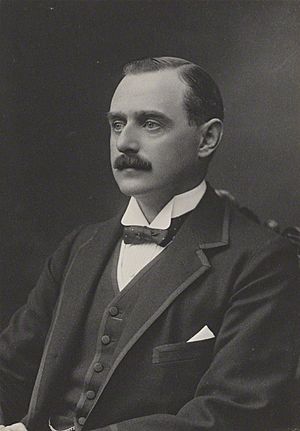Arthur Murray, 3rd Viscount Elibank facts for kids
Quick facts for kids
Arthur Murray, 3rd Viscount Elibank
|
|
|---|---|
 |
|
| Birth name | Arthur Cecil Murray |
| Born | 27 March 1879 |
| Died | 5 December 1962 (aged 83) |
| Rank | Lieutenant-Colonel |
Arthur Cecil Murray (born March 27, 1879 – died December 5, 1962) was a British army officer and politician. He was also known as the 3rd Viscount Elibank. During his career, he served in the military and later became a Member of Parliament, representing areas in Scotland.
Contents
Early Life and Schooling
Arthur Murray was the fourth son of the 1st Viscount Elibank. His family moved to Dresden, Germany, in 1886. He started his education there. He also attended Sunningdale School in Berkshire, England.
Military Career
Arthur Murray joined the Royal Military Academy Sandhurst, a famous military college. In 1898, he became a second lieutenant in the Indian Staff Corps. The same year, he worked as an Aide-de-Camp (a personal assistant) to the Lieutenant Governor of Bengal, Sir John Woodburn.
Serving in China and India
In 1900, Murray was part of an international force in China. This force helped to stop the Boxer Rebellion. He led a group of mounted soldiers. Their job was to protect the Sinho-Shanhaikwan Railway. After this, he served in the North-West Frontier and in Chitral. In 1907, he was promoted to captain in the 5th Gurkha Rifles.
Political Career
In 1908, Arthur Murray entered politics. He was chosen by the Liberal Party to run for a seat in Parliament. He won the election for Kincardineshire. He stayed a Member of Parliament (MP) for this area and its new form, Kincardine and Aberdeenshire West, until 1923.
Working in Government
From 1910 to 1914, he worked as a Parliamentary Private Secretary. He assisted Sir Edward Grey, who was the Foreign Secretary. This meant he helped with important international matters.
World War I Service
During World War I, Murray served in France and Belgium from 1914 to 1916. He was with the 2nd King Edward's Horse regiment. He was recognized for his bravery and was awarded the Distinguished Service Order in 1916. From 1917 to 1918, he worked as an Assistant Military Attaché in Washington, D.C. In 1919, he received the CMG award.
Later Political Views
Even though his party was part of the government, Murray disagreed with some policies of the Prime Minister, David Lloyd George. He lost his seat in Parliament in the 1923 election.
After Parliament
After leaving Parliament, Arthur Murray continued to be interested in politics, especially foreign policy. He wrote several books and pamphlets about these topics. He also became a director for the London and North Eastern Railway from 1923 to 1948. He was also a director for Wembley Stadium. In 1936, he joined the National Liberals.
Later Life and Family
In 1951, Arthur Murray inherited two important titles: Viscount Elibank and Lord Elibank of Ettrick Forest. This happened after his older brothers passed away. He was also a member of the Royal Company of Archers. In 1931, he married the actress Faith Celli. They did not have any children, and Faith Celli died in 1942.
Arthur Murray passed away in December 1962. After his death, the title of Viscount Elibank ended.
Images for kids
 | John T. Biggers |
 | Thomas Blackshear |
 | Mark Bradford |
 | Beverly Buchanan |


